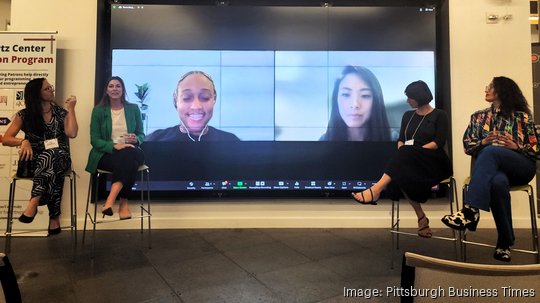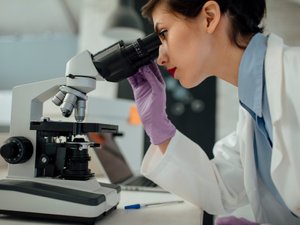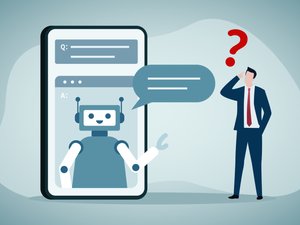
The use of artificial intelligence in biotech is no novel concept, but concerns from experts are mounting about the technology's use in emerging startups working to solve challenges across the medical and life sciences industry.
That was one of the key takeaways from the "P.O.W.E.R. 2023 – The Power of AI in Biotech" event Thursday evening hosted by the Pittsburgh chapter of Women in Bio, a national organization working to advance the careers, leadership and entrepreneurship paths for all women working at the crossroads of biology and technology.
During a panel discussion at Carnegie Mellon University's Swartz Center for Entrepreneurship, five panelists and a moderator discussed the various use cases AI has had in the biotech industry and the types of environments it might be used for it in the years to come.
Below are three considerations the panelists stressed for young biotech companies to evaluate as they enter the industry.
Consider the data
Dr. Marielle S. Gross, assistant professor of bioethics and a rural women’s health physician at the University of Pittsburgh and Johns Hopkins University, stressed that not all datasets used by AI platforms are equal and some datasets use erroneous or misleading sources. She emphasized that it's important to find out the methods of data collection for a given dataset before accepting anything an AI model might generate based on that information. Finding out its sourcing methods is crucial as well, she said.
"It's what's not in the data that we need to be thinking about," Dr. Gross said. "I would really advocate for more data scientists, machine learning and AI people to go physically into clinical spaces, watch clinical encounters, watch surgeries. See where the data comes from, where it goes to and really get your eyes on what the source value is."
Jana Kainerstorfer, associate professor in biomedical engineering at CMU, is working on developing noninvasive optical imaging methods for disease detection and treatment monitoring. She took Dr. Gross' point a step further and highlighted the biases that exist today with modern data collection, like the tendency for pulse oximeters to render inaccurate information for people who have darker skin complexions, can also exist with AI tools. And, she noted, these are biases that can emerge from in-house data, not just information collected elsewhere.
"Oftentimes, we don't have an adverse enough dataset to even train an AI algorithm and show the efficacy of a device," Kainerstorfer said. "The fact that pulse oximeters are not as accurate for [people who have] darker skin is something that I find mindblowing in 2023."
Be realistic with the data and protect it
Jessica Gibson, CEO and co-founder of Pittsburgh-based Ariel Precision Medicine Inc., said even quality data needs to be thoroughly analyzed. But this data also needs to undergo rigorous protections, especially if it pertains to human health information. She said she's been this with her startup, which has built an AI platform designed to help doctors better treat patients with chronic health conditions by crunching germline genetic and clinical data.
"If you want to start a company using any form of AI, be really realistic with the quality of your data, where it's stored, who owns it, how are you protecting it especially now that data privacy is a huge thing," Gibson said. "There's a number of considerations even outside of regulatory — but also regulatory — that need to come into the question of how to build a business around this technology."
Weigh the ethics
Oana Carja, assistant professor in the computational biology department at CMU, questioned how much of the information biotech startups collect should be open sourced to the public and the ramifications that might come with such information being made available to the masses. She used an example in her lab where she is researching topics like toxicity in drug discovery by using network theory, population genetics, machine learning and statistical inference, among others.
"Increasingly, we're trying to understand the toxicity of a compound for drug discovery, which allows you to also understand what might be a bioweapon; that's the other side of the coin," Carja said. "In effect, we are also democratizing or commoditizing access to toxic compounds. So thinking through these issues is definitely a very hard problem."









